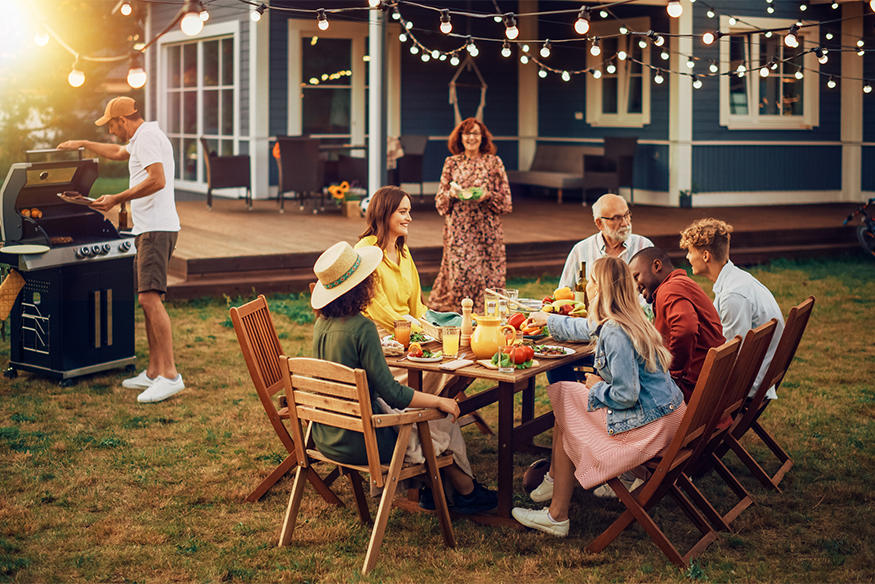Latest News
Prevention
Practice healthy cooking and eating to reduce your cancer risk
Jul 2, 2025

With summer in full swing, holidays and vacations are within arms’ reach, and so are the grill tongs. While cookouts and barbecues are a bedrock of community and togetherness, where some of the most delicious food is frequently on the menu, it is important to exercise moderation and to be aware of the health risks that are inherent in the food we eat and the ways certain meals are prepared.
We recently spoke with two experts at VCU Massey Comprehensive Cancer Center—Samantha Haswell, M.S., a registered dietitian, and David Turner, Ph.D., a member of the Cancer Prevention and Control research program—to learn more about the cancer risks involved in what and how we eat and some effective strategies to help reduce that risk.
What are advanced glycation end products?
Turner: When sugars, proteins and fats are in the body, they can actually combine and form what is
 Pictured: David Turner, Ph.D.
known as advanced glycation end products, or AGEs for short. Over time, AGEs accumulate in our tissues causing oxidative stress and inflammation, and high levels are linked to the development of chronic diseases, including cancer. More highly processed foods, as well as foods that are cooked at higher temperatures, will dramatically increase AGE formation. Raw or minimally processed foods typically have lower AGE levels by comparison. Low AGE levels have been linked to accelerated wound healing, decreased inflammation and oxidative stress, improved insulin sensitivity, and even a longer lifespan. Therefore, it’s important to monitor AGE levels as a marker of overall health and take realistic steps to reduce the consumption of foods that contain these harmful compounds as much as possible.
Pictured: David Turner, Ph.D.
known as advanced glycation end products, or AGEs for short. Over time, AGEs accumulate in our tissues causing oxidative stress and inflammation, and high levels are linked to the development of chronic diseases, including cancer. More highly processed foods, as well as foods that are cooked at higher temperatures, will dramatically increase AGE formation. Raw or minimally processed foods typically have lower AGE levels by comparison. Low AGE levels have been linked to accelerated wound healing, decreased inflammation and oxidative stress, improved insulin sensitivity, and even a longer lifespan. Therefore, it’s important to monitor AGE levels as a marker of overall health and take realistic steps to reduce the consumption of foods that contain these harmful compounds as much as possible.
What types of food are high in AGEs?
Turner: All foods naturally contain AGEs, and you cannot completely avoid them. Things like grilled beef, parmesan cheese and bacon all tend to have drastically higher levels of AGEs. Conversely, things like white rice and raw fruits and vegetables are on the lower end of the spectrum.
Can how I cook meat increase cancer risk?
Haswell: Research suggests that cooking meats like chicken, fish, red meat and other animal products directly on a hot grill at a temperature of 300 degrees Fahrenheit or higher can cause cancerous chemicals—heterocyclic amines—to form. It has also been found that carcinogens known as polycyclic aromatic hydrocarbons deposit directly onto animal products or plant products from the smoke created when cooking on the grill.
Turner: Cooking foods at higher temperatures through grilling, broiling, roasting and frying can all increase levels of AGE formation in foods.
Does the type of grill affect cancer risk?
Haswell: Both charcoal and gas grills present the same risks because they both cook foods at high temperatures and produce smoke.
What can I do to reduce cancer risk when grilling or cooking?
Haswell:
- Marinade your meat at least 30-40 minutes before you place it on the grill. That little protective coating, especially for meats like chicken, can lower the risk of carcinogens from the grill by nearly 90 percent.
- If you stick any of your meats in the microwave for about two minutes before you throw it on the grill, you’ve already cooked most of it, which means there is a lot less grilling time.
- Wrap your food in foil to keep flames from directly touching the meat.
- Don’t reuse the same oils repeatedly. Avoid heating oils, allowing them to cool and reusing them as this can cause formation of heterocyclic amines.
 Pictured: Samantha Haswell, M.S
Pictured: Samantha Haswell, M.S
Turner:
- Don't overcook meats. Watch for burning and charring. That might be the part that tastes the best, but it is also the bit that can actually do the most long-term damage to your body.
- Try to cook foods at lower temperatures. Don't use high heat. Slow cookers can be a fantastic option because they use moist heat, and it is slow.
- You can use lemon juice and vinegar in your marinades. More acidic marinades can actually inhibit how the sugars and fats come together.
What about fruits and vegetables?
Haswell: Fruits and vegetables are high in phytochemicals that can help reduce your overall cancer risk. A balanced diet should include a variety of colorful plant-based foods rich in phytochemicals. Fruits and vegetables are OK to put directly onto a hot grill with regard to cancerous chemicals from flames, but keep in mind that those polycyclic aromatic hydrocarbons can still be deposited when there is smoke present. Making skewers with a mix of grilled fruits, vegetables and meats is a great opportunity to reduce meat intake, limit carcinogens and add color to your summer plate.
Does it matter what time that I eat?
Turner: Research has shown that time-restricted eating can be beneficial for your health. If you only eat food between the hours of 10 a.m. and 6 p.m., that alone can reduce AGE-induced tumor growth.
Am I supposed to just give up grilled meat and unhealthy food forever?
Haswell: I’m not going to tell anyone they can never have a steak on the grill ever again. It is just important to take proactive steps to reduce your health risks as much as you can using evidence-based dietary strategies.
Turner: Foods high in AGEs taste great, and I do have the odd slice of bacon now and again because I want to have a quality of life. But if you're eating bacon three or four times a week, that's maybe something to start thinking about differently. By being aware of what AGEs are and the damage they cause, we can make informed changes to our lives, which can slow down the amount of AGEs we accumulate in our tissues and lower our disease risk as we grow older. Living a healthier lifestyle—eating better, exercising more—can help to avoid a cancer diagnosis in the first place. And it can really help enhance the treatment of cancer after it is diagnosed, and also improve quality of life when living with cancer.
Written by: Blake Belden
Related News
Clinical Care, Prevention
Smoking cessation: Why it’s important, the benefits of quitting, and where to beginNov 20, 2025

Get access to new, innovative care
Treatments in clinical trials may be more effective or have fewer side effects than the treatments that are currently available. With more than 200 studies for multiple types of cancers and cancer prevention, Massey supports a wide array of clinical trials.

Find a provider
Massey supports hundreds of top cancer specialists serving the needs of our patients. Massey’s medical team provides a wealth of expertise in cancer diagnosis, treatment, prevention and symptom management.
